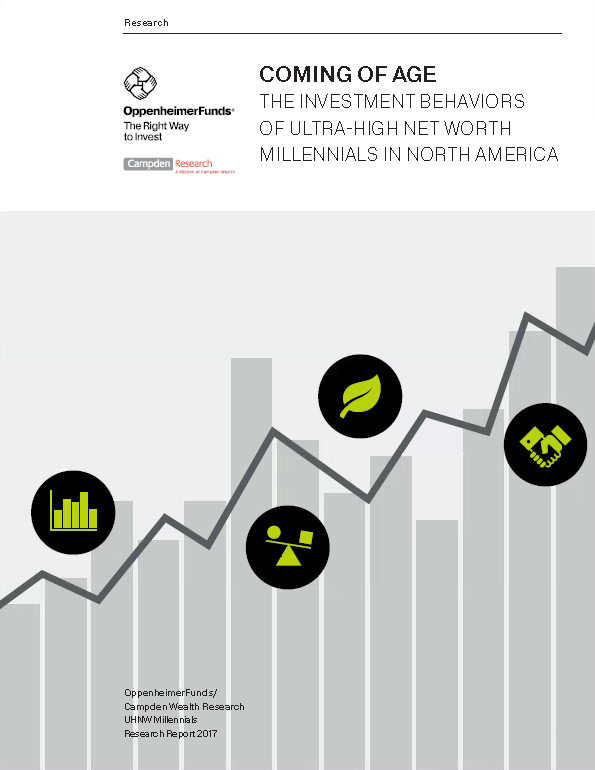Millennials look to boost 'risk-on' investments, increase deal flow

Wealthy North American Millennials intend to make “significant changes” to the way family investments are managed once they assume control, notably increasing 'risk on' allocations to values-based and illiquid investments, new research suggests.
Coming of age: The investment behaviours of ultra-high net worth Millennials in North America found only one-fifth (21%) are fully satisfied with the current objectives and guidelines of their families' portfolios, despite 65% having a say in their family's allocations.
When asked what changes they would make, one-third of Millennial respondents (individuals born between 1980 and 1995) said that they would incorporate environmental, social, and governance (ESG) standards into their family's benchmarks.
Equally, one-third would increase their allocations to impact investments. Another third said they would delve into less liquid investments such as hedge funds and private equity.
 The research by Campden Wealth, in partnership with OppenheimerFunds, found on average, ultra-high net worth (UHNW) Millennial respondents allocated 14% of their personal portfolio to impact investments.
The research by Campden Wealth, in partnership with OppenheimerFunds, found on average, ultra-high net worth (UHNW) Millennial respondents allocated 14% of their personal portfolio to impact investments.
It said that this is likely to increase, despite 58% of Millennials considering this asset class to be of moderate-to-high risk.
A second-generation respondent in his mid-30s from the US West Coast said his personal goal for his family's portfolio had always been impact investing.
“We're never going to be 100% impact-oriented – that is not realistic. But my goal is to get us more aligned with our family values and mission,” he said.
Based on a quantitative survey of 32 Millennial wealth holders, and interviews with six Millennial wealth holders and three advisers, the report suggests wealthy families be aware of these changes.
In particular, it advises to engage in discussion about how Millennials would like portfolios structured, and/or incorporating ESG filters into their investment decisions.
Despite a high conviction about increasing their allocation to values-based investments, there is a noticeable “knowledge gap” between Millennials desire to increase these type of investments and their investment knowledge and due diligence.

Fewer than one in three (32%) Millennials rated their values-based investment knowledge highly. Almost one in four (24%) perceive their knowledge to be either poor or very poor, with 42% claiming that they would like to learn more about this area.
At present US equities, real estate, and cash – in that order – are the top three asset classes in their portfolios. Combined, these three also account for over half (57%) of the average UHNW Millennial portfolio, with emerging market equities ranked as the asset class with the highest perceived risk.
As Millennial investors look to increase their illiquid investments, the research found this cohort relies heavily on a tightly knit professional and familial networks for investment advice.

“UHNW Millennials are increasingly taking calculated risks with their investments while considering the potential long-term implications of these decisions,” said Ned Dane, head of private client group at OppenheimerFunds.
“Advisers can leverage actionable insights like these to encourage multigenerational family dialogues that incorporate evolving Millennial viewpoints. They can also bring value directly to Millennial clients, for example, by helping them explore alternative investment opportunities and conducting due diligence.”
Dominic Samuelson, chief executive of Campden Wealth, said it was clear Millennials' views differed from previous generations as the age group edged closer to taking ownership of the family wealth.
“They want to make a positive change through impact investing and by implementing ESG standards to their family portfolios. They also appear to be more open to risk as they intend to access less liquid strategies. Those findings have significant implications for intergenerational wealth transfer and the wider wealth management industry.”
Each Millennial respondent came from a family with net worth ranging from $35 million to $1 billion.






